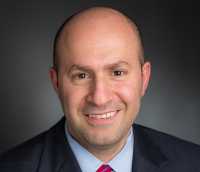
18 Aug Renal-Cell Carcinoma: Adjuvant Pembrolizumab after Nephrectomy
MedicalResearch.com Interview with:

Dr. Choueiri
Toni K. Choueiri, MD
Director, Lank Center for Genitourinary Oncology
Director, Kidney Cancer Center
Jerome and Nancy Kohlberg Chai
Professor of Medicine, Harvard Medical School
MedicalResearch.com: What is the background for this study? What are the main findings?
Response: The standard of care for patients diagnosed with locoregional RCC is partial or total nephrectomy. Nearly half of patients will eventually experience disease recurrence following nephrectomy and no standard, globally approved adjuvant therapy options are currently available for this population. The phase 3 KEYNOTE-564 study met its primary objective of demonstrating a statistically significant and clinically meaningful improvement in disease-free survival with pembrolizumab vs placebo as adjuvant therapy for patients with RCC post nephrectomy, supporting pembrolizumab as a potential new standard of care for patients at high risk of disease recurrence following surgery.
MedicalResearch.com: What should readers take away from your report?
Response: Based on results from the first prespecified interim analysis of KEYNOTE-564, pembrolizumab may become a common adjuvant treatment for patients with high risk of disease recurrence post nephrectomy. It is not yet clear whether the use of pembrolizumab in the adjuvant setting will impact subsequent treatment decisions in the advanced setting and additional analyses are needed to inform on this question.
KEYNOTE-564 is a randomized, double-blind, placebo-controlled, phase 3 study that provides the first positive data for immunotherapy in adjuvant RCC, an area of high unmet clinical need. The KEYNOTE-564 results have potentially practice-changing implications for patients with post nephrectomy with a high risk of disease recurrence.
Disclosures: The research was supported by Merck Sharp & Dohme Corp., a subsidiary of Merck & Co., Inc.
Citation:
Adjuvant Pembrolizumab after Nephrectomy in Renal-Cell Carcinoma.
Toni K. Choueiri, M.D., Piotr Tomczak, M.D., Ph.D., Se Hoon Park, M.D., Balaji Venugopal, M.D., Thomas Ferguson, M.D., Yen-Hwa Chang, M.D., Ph.D., Jaroslav Hajek, M.U.Dr., Stefan N. Symeonides, M.D., Ph.D., Jae Lyun Lee, M.D., Ph.D., Naveed Sarwar, M.D., Ph.D., Antoine Thiery-Vuillemin, M.D., Ph.D., Marine Gross-Goupil, M.D., Ph.D., for the KEYNOTE-564 Investigators
August 19, 2021
N Engl J Med 2021; 385:683-694
DOI: 10.1056/NEJMoa2106391
JOIN OUR EMAIL LIST
[mailpoet_form id="5"]We respect your privacy and will never share your details.
[last-modified]
The information on MedicalResearch.com is provided for educational purposes only, and is in no way intended to diagnose, cure, or treat any medical or other condition. Always seek the advice of your physician or other qualified health and ask your doctor any questions you may have regarding a medical condition. In addition to all other limitations and disclaimers in this agreement, service provider and its third party providers disclaim any liability or loss in connection with the content provided on this website.
Last Updated on August 18, 2021 by Marie Benz MD FAAD
